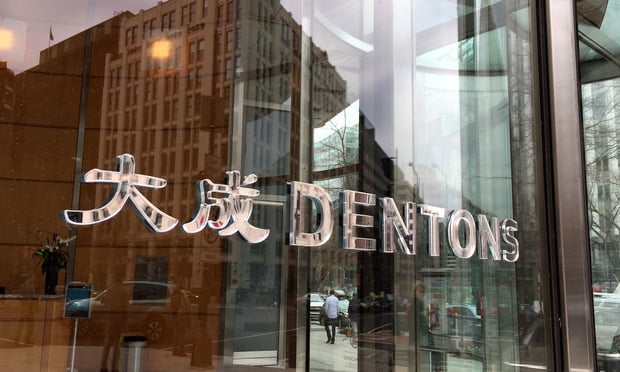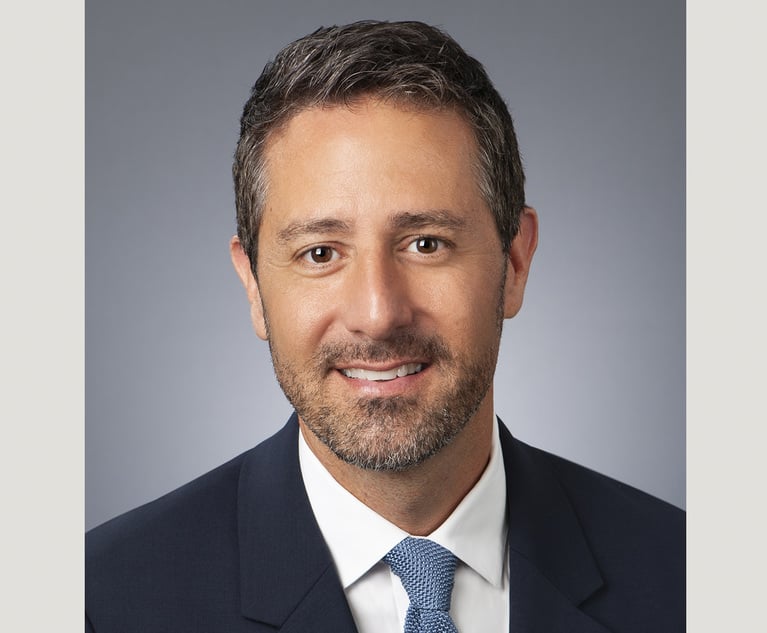Florida Is a Top Priority for Dentons as It Looks to Expand in US
Dentons global chairman Joe Andrew says the firm is in the midst of ongoing merger talks with "several" firms in the state.
November 18, 2019 at 02:54 PM
6 minute read
 Photo: Diego M. Radzinschi/ALM
Photo: Diego M. Radzinschi/ALM
Dentons has made the Florida market a top priority in its ambitious U.S. expansion plan and is in the midst of ongoing merger talks with several firms in the state, according to Dentons global chairman Joe Andrew.
Talks with "a number" of firms have gotten to the point where they are exchanging confidential financial data and the target firm's leadership have signed nondisclosure agreements, Andrew said in an interview with The American Lawyer.
"Some of these are pretty far along," he added. "With others, we're optimistic. But we're still learning about each other."
Andrew would not disclose how many firms are in merger talks with the firm.
 Joe Andrew
Joe AndrewThe more mature conversations began before Dentons announced its plans to expand in the United States by bolting on midsized firms through a dual-partnership model—a twist on the Swiss verein model. The "Project Golden Spike" strategy, named after the ceremonial 17.6-karat gold spike that tied together the Transcontinental Railroad in 1869, lays out a plan for Dentons to establish a presence in the top 100 U.S. markets by legal spend, creating what it calls a "national law firm."
Andrew said Dentons is looking for firms with deep connections to the local and midsized companies in their respective markets. An ideal merger partner would be the Florida firm that represents the most prominent regional banks in Jacksonville, for example, and whose attorneys have close ties to the community—participating in the local Chamber of Commerce or patronizing the city's art museum, for example.
Dentons is also prioritizing firms with strong transactional practices. Head count, Andrew said, is a secondary factor.
GrayRobinson president and CEO Dean Cannon said that Dentons did reach out to his firm, but added that GrayRobinson is not interested in a merger.
 Dean Cannon
Dean Cannon"Florida is a growth state and a growing market, so it makes sense for a firm like Dentons to approach firms like ours," Cannon said in a statement. "However, we are not pursuing a partnership with Dentons and instead are focused on continuing our expansion within the Florida market and beyond."
Bowman Brown, chairman of 300-attorney Shutts & Bowen, said he has not received correspondence from Dentons, although he indicated that the firm isn't interested in a merger either.
"We're doing terrifically well," Brown said. "Why would we screw that up?"
Carlton Fields declined to comment. A spokesperson for the firm said "it's our policy not to comment on such matters."
Bilzin Sumberg also declined to comment.
Greenspoon Marder and the three largest Florida-based firms—Greenberg Traurig, Holland & Knight and Akerman—did not immediately return a request for comment.
Untapped Potential
Dentons finds Florida attractive for two primary reasons, Andrew said. First is the sheer size of the state's legal market. According to legal research firm Acritas, Florida is home to seven of the top 100 markets by legal spend in the U.S.: Miami-Fort Lauderdale-West Palm, Orlando-Lakeland-Deltona, Tampa-St. Petersburg-Clearwater, Jacksonville, North Port-Sarasota, Cape Coral-Fort Myers-Naples and Palm Bay-Melbourne-Titusville.
These metro areas represented a combined $19 billion in legal spend in 2018—equivalent to the entire legal market of Italy, and greater than the legal market of Spain. Orlando's market is larger than Switzerland's; Tampa's is larger than Austria's.
Not only does the state boast a huge market, but Dentons sees a first-mover opportunity. Relative to its size, Florida has few "global" law firms on par with Dentons' reach, Andrew said. ALM data supports his point.
Although Florida is host to 63 Am Law 200 firms, including Weil, Gotshal & Manges, Jones Day, and K&L Gates, the majority of out-of-state entrants have focused exclusively on South Florida.
Four of the top 10 U.S. law firms by revenue don't have any presence in Florida. Five of the top 10 firms have a presence solely in Miami, including three vereins with sprawling global outposts: DLA Piper, Baker McKenzie and Hogan Lovells. The only top-10 firm in the state that has a presence outside of Miami is White & Case, which also has an office in Tampa.
Dentons has a small Miami presence and acquired a Naples-based wealth team from its October merger with Cohen & Grigsby, so Andrew sees a lot of room for growth.
"Many states have a lot of potential, but none has more potential than Florida," Andrew said.
However, the fact that so few large firms have attempted to expand statewide could be a red flag, said Joe Ankus, a longtime Florida-based legal recruiter.
"Are they a visionary or are they coming late into a game that others have decided they wouldn't play?" Ankus said. "I wish them luck but I'd say history should be a guide."
 Bowman Brown
Bowman BrownFor one, rates are often incompatible with those of global law firms. Despite the relative size of the seven Florida markets, only Miami and the international transactional work that thrives within South Florida can secure Big Law rates.
"In order to get a return on their investment, global firms need to charge higher rates and that's not always easy to do in a market like this," Shutts & Bowen's Brown said.
Shutts and several regional Florida firms have, in turn, developed strong referral relationships with New York firms. These long-standing reciprocal relationships mean that big firms don't have to shell out the overhead for a presence in the Sunshine State and clients benefit from the lower rate structure.
Given that Dentons plans to establish a presence in both large and small cities, lower rates do not seem to be an issue. When Dentons absorbed Cohen & Grigsby and Midwest firm Bingham Greenebaum Doll in October, CEO Elliott Portnoy said that regional firms maintain control over billing rates, compensation structure and governance.
Much of the firm's success, Ankus said, will hinge on whether or not Florida's more prestigious firms will bite on a merger and how Dentons will handle conflicts. The firm's pitch of connecting local clients to international offices and teams doesn't seem as compelling, he added.
"My unsolicited advice to Dentons is if you're acquiring firms en masse, do your due diligence to make sure you're not a lifeboat to struggling Florida firms," Ankus said.
Similar Stories:
Dentons' Expansion in Florida Is Part of New US Strategy
Did You Say Dentons? Greenberg Traurig Has Already Positioned Itself as a 'National Firm'
This content has been archived. It is available through our partners, LexisNexis® and Bloomberg Law.
To view this content, please continue to their sites.
Not a Lexis Subscriber?
Subscribe Now
Not a Bloomberg Law Subscriber?
Subscribe Now
NOT FOR REPRINT
© 2025 ALM Global, LLC, All Rights Reserved. Request academic re-use from www.copyright.com. All other uses, submit a request to [email protected]. For more information visit Asset & Logo Licensing.
You Might Like
View All
'Ridiculously Busy': Several Law Firms Position Themselves as Go-To Experts on Trump’s Executive Orders
5 minute read
Holland & Knight Hires Former Davis Wright Tremaine Managing Partner in Seattle
3 minute read
Am Law 200 Firms Announce Wave of D.C. Hires in White-Collar, Antitrust, Litigation Practices
3 minute read
Paul Hastings Hires Music Industry Practice Chair From Willkie in Los Angeles
Law Firms Mentioned
Trending Stories
- 15th Circuit Considers Challenge to Louisiana's Ten Commandments Law
- 2Crocs Accused of Padding Revenue With Channel-Stuffing HEYDUDE Shoes
- 3E-discovery Practitioners Are Racing to Adapt to Social Media’s Evolving Landscape
- 4The Law Firm Disrupted: For Office Policies, Big Law Has Its Ear to the Market, Not to Trump
- 5FTC Finalizes Child Online Privacy Rule Updates, But Ferguson Eyes Further Changes
Who Got The Work
J. Brugh Lower of Gibbons has entered an appearance for industrial equipment supplier Devco Corporation in a pending trademark infringement lawsuit. The suit, accusing the defendant of selling knock-off Graco products, was filed Dec. 18 in New Jersey District Court by Rivkin Radler on behalf of Graco Inc. and Graco Minnesota. The case, assigned to U.S. District Judge Zahid N. Quraishi, is 3:24-cv-11294, Graco Inc. et al v. Devco Corporation.
Who Got The Work
Rebecca Maller-Stein and Kent A. Yalowitz of Arnold & Porter Kaye Scholer have entered their appearances for Hanaco Venture Capital and its executives, Lior Prosor and David Frankel, in a pending securities lawsuit. The action, filed on Dec. 24 in New York Southern District Court by Zell, Aron & Co. on behalf of Goldeneye Advisors, accuses the defendants of negligently and fraudulently managing the plaintiff's $1 million investment. The case, assigned to U.S. District Judge Vernon S. Broderick, is 1:24-cv-09918, Goldeneye Advisors, LLC v. Hanaco Venture Capital, Ltd. et al.
Who Got The Work
Attorneys from A&O Shearman has stepped in as defense counsel for Toronto-Dominion Bank and other defendants in a pending securities class action. The suit, filed Dec. 11 in New York Southern District Court by Bleichmar Fonti & Auld, accuses the defendants of concealing the bank's 'pervasive' deficiencies in regards to its compliance with the Bank Secrecy Act and the quality of its anti-money laundering controls. The case, assigned to U.S. District Judge Arun Subramanian, is 1:24-cv-09445, Gonzalez v. The Toronto-Dominion Bank et al.
Who Got The Work
Crown Castle International, a Pennsylvania company providing shared communications infrastructure, has turned to Luke D. Wolf of Gordon Rees Scully Mansukhani to fend off a pending breach-of-contract lawsuit. The court action, filed Nov. 25 in Michigan Eastern District Court by Hooper Hathaway PC on behalf of The Town Residences LLC, accuses Crown Castle of failing to transfer approximately $30,000 in utility payments from T-Mobile in breach of a roof-top lease and assignment agreement. The case, assigned to U.S. District Judge Susan K. Declercq, is 2:24-cv-13131, The Town Residences LLC v. T-Mobile US, Inc. et al.
Who Got The Work
Wilfred P. Coronato and Daniel M. Schwartz of McCarter & English have stepped in as defense counsel to Electrolux Home Products Inc. in a pending product liability lawsuit. The court action, filed Nov. 26 in New York Eastern District Court by Poulos Lopiccolo PC and Nagel Rice LLP on behalf of David Stern, alleges that the defendant's refrigerators’ drawers and shelving repeatedly break and fall apart within months after purchase. The case, assigned to U.S. District Judge Joan M. Azrack, is 2:24-cv-08204, Stern v. Electrolux Home Products, Inc.
Featured Firms
Law Offices of Gary Martin Hays & Associates, P.C.
(470) 294-1674
Law Offices of Mark E. Salomone
(857) 444-6468
Smith & Hassler
(713) 739-1250










